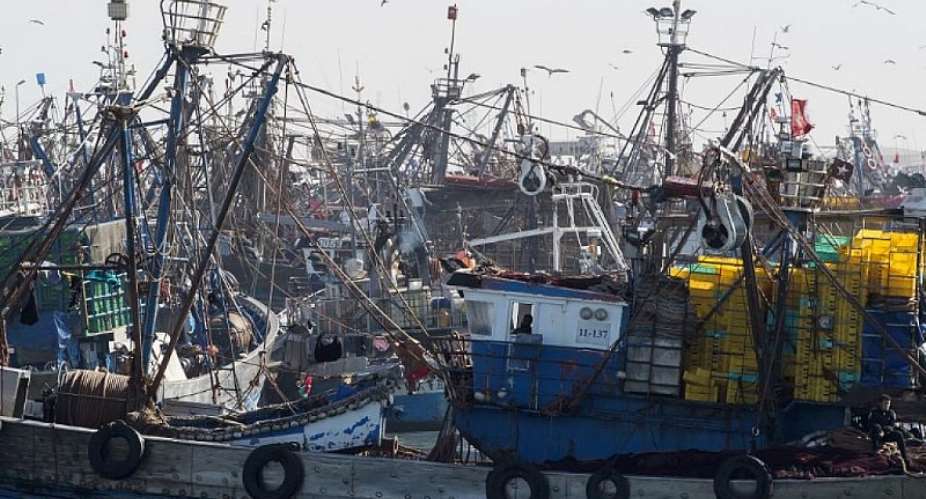The European Union parliament has voted to adopt the EU-Moroccan fisheries deal, enabling EU fishing vessels to operate in the waters off the coast of the disputed territory of Western Sahara. The agreement bypasses the official legal opinion delivered by the European Court of Justice in 2016.
“A new agreement on the legal, environmental, economic and social governance of EU vessels' fishing activities in Morocco and Western Sahara waters was approved on Tuesday,” according to the European Parliament.
European lawmakers overwhelmingly voted for the deal with 415 votes in favour, 189 against, and 49 abstentions.
A statement from the European parliament said the agreement would not prejudice the ongoing political process on the final status of Western Sahara, adding that it took into account the official opinion of the European Court of Justice.
Critics of the EU-Morocco agreement say it actually strengthens Morocco's claim over the disputed territory and undermines the EU's own court ruling.
“The position of Frente Polisario (Polisario Front) has always been clear: the trade deal is illegal under EU and international law, threatens to undermine the UN Peace Process, and strengthens Morocco's illegal, brutal occupation of Western Sahara,” said Nour Bakr, a policy officer with Independent Diplomat, an advisory group working for the Frente Polisario, the political group that represents the Western Sahara people.
“The deal will be unequivocally challenged using every legal and diplomatic avenue possible with a clear sense that the EU Commission have categorically failed to meet any of the legal criteria established by the European Court of Justice,” he told RFI.
Bakr refers to the official opinion by Advocate General Melchior Wathelet, who stated that Western Sahara is not part of Moroccan territory, and that the EU-Moroccan trade agreement should not apply to it.
“The EU, its institutions, and members of parliament have been addressing this aspect of rule of law over the last year or so. In Hungary, Poland, and now Venezuela,” said Erik Hagen, executive director of Western Sahara Resource Watch (WSRW) , a watchdog group that monitors foreign interests in Western Sahara.
“It is beyond my comprehension that they openly vote the way they do, ignoring the highest court of the European Union. It is a shocking double standard and the EU loses all credibility when it tries to impose democracy on governments outside of the EU,” Hagen told RFI.
The fishing deal is valued at some 153.6 million euros over a four-year period, a calculation cited by the AFP news agency. Hagen says that these monies would go into supporting Moroccan settlers in the disputed Western Sahara.
In a letter addressed to the EU Parliament on Monday, US-based human rights group Human Rights Watch said “in practice, in order for Morocco, as an occupying power, to lawfully exploit Western Sahara's resources, it would have to establish a fund with transparent bookkeeping that shows the resources utilized or exported, the revenue derived, and the channelling of those revenues to the sole benefit of the people of Western Sahara.”
The letter further stated that no mechanism exists with regard to the resources of Western Sahara. The European Parliament fisheries committee admitted in a 2018 assessment that “ more 90 percent of the catch by the EU fleet is taken in the waters adjacent to the Western Sahara.”
The people of Western Sahara are frustrated and felt ignored, said WSRW's Hagen. “All Saharawi groups advocating for self-determination on the civil society level and the UN-recognised liberation movement [Polisario Front] have condemned and objected to the EU's approach,” said WSRW's Hagen.
He added that the EU claimed locals were consulted, but only 18 groups were officially approached.
“The EU asked Moroccan government bodies and Moroccan puppet associations in Western Sahara, and they all said the deal was a good idea, while some 100 groups objected,” he said, adding that the 18 groups constituted support.
“The EU received the objections from Saharawis and they put it in a drawer, because it doesn't correspond to the answer they want to hear,” he added.





 Ejisu by-election: Aduomi warns NPP against voter intimidation
Ejisu by-election: Aduomi warns NPP against voter intimidation
 High Court orders implicated four NDA officials to present defence
High Court orders implicated four NDA officials to present defence
 Let’s all be matured, patriotic to have a peaceful election this year – Dampare ...
Let’s all be matured, patriotic to have a peaceful election this year – Dampare ...
 Mahama's administration saw thievery that knew no bounds; stole from market wome...
Mahama's administration saw thievery that knew no bounds; stole from market wome...
 GRA/SML deal: Always read the stories behind the headlines or you'd look stupid ...
GRA/SML deal: Always read the stories behind the headlines or you'd look stupid ...
 GRA/SML Contract: It takes some 'wild' boldness for a president to make this dec...
GRA/SML Contract: It takes some 'wild' boldness for a president to make this dec...
 Elisu By-election: "If you call yourself a man, boo Chairman Wontumi again" — Bo...
Elisu By-election: "If you call yourself a man, boo Chairman Wontumi again" — Bo...
 Fuel tanker driver escapes with his life after tanker goes up in flames near Suh...
Fuel tanker driver escapes with his life after tanker goes up in flames near Suh...
 Uniform change: ‘Blue and white are brighter colours’ — Kwasi Kwarteng explains ...
Uniform change: ‘Blue and white are brighter colours’ — Kwasi Kwarteng explains ...
 MoE not changing all public basic school uniforms but only newly built ones — Kw...
MoE not changing all public basic school uniforms but only newly built ones — Kw...
